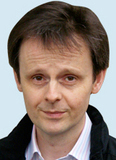By Damian Thompson
Telegraph
January 22, 2009
http://blogs.telegraph.co.uk/damian_thompson/blog/2009/01/22/has_bishop_mcmahon_been_summoned_to_rome_to_be_offered_westminster
 |
| Damian Thompson |
If you don't like rumours, look away now. A source tells me that Bishop Malcolm McMahon of Nottingham - a Left-wing Dominican with a taste for traddie liturgy - has been "summoned to Rome" to discuss succeeding Cormac at Westminster.
When I asked my contact how sure he was that +Malcolm would get the top job, he said "I reckon it's a two thirds chance". Which, given that he is on the terna along with +Vin Nichols and +Peter Smith, makes him a strong front runner.
My source said the bishop had already been to Rome. I'm going to try to reach him by phone to ask - not that he would be free to say anything much, and all three candidates will have been in Rome fairly recently.
"Call me Malcolm" is rumoured to be the Cardinal's choice. You might think that's unusual, since the one thing everyone knows about the Bishop of Nottingham is that he enjoys the pre-Vatican II liturgy, which +Cormac has done nothing to encourage despite the clear wishes of the Pope.
But think about the other names on the terna. Cormac and Vincent aren't close, possibly because the latter hasn't done enough to hide his exasperation with Magic Circle ineptitude.
Peter Smith, on the other hand, is the Magic Circle choice, and apparently that of the Nuncio, too. That counts for a lot. Why hasn't he also been anointed by His Eminence? Let me leave you with a clue: a quite fascinating post from last year by the author of the Nova et Vetera blog (with my emphases):
According to a source in one of the Roman congregations, someone who has worked with His Holiness in the past, the only two names among our present hierarchy that the Pope is both familiar with and approves of, are those of the Archbishop of Cardiff, Peter Smith, and the Bishop of East Anglia, Michael Evans. The latter is supposedly very ill indeed, and therefore not a likely candidate. Peter Smith might well be a candidate—his name already has been mentioned as being in the running.
A Londoner, ordained for the Archdiocese of Southwark in the early 1970s, having studied for the priesthood at St John's Seminary, Wonersh, he served as assistant priest at Larkhall Lane, Stockwell, for a very short period, and then went to Rome to study Canon Law. At the English College, he was highly critical of the lax and liberal atmosphere fostered by the then Rector, one, er, Monsignor Cormac Murphy-O'Connor, and, I think, left to live at the Beda College instead.
Back in England, he returned to St John's Seminary, Wonersh, and taught Canon Law and associated subjects (this was before the promulgation of the 1983 Code, when it was rather difficult to teach this subject, since everyone knew things were about to change, but not how). In due course, he was made Vice-Rector, and was much admired by the more conservative students, since he made no secret of his difference of views with the then Rector, one, er, Monsignor Christopher Budd, who was then systematically changing the seminary into something more like an Anglican Theological College.
For a year, Peter Smith was placed in charge of a parish—St Andrew's, Thornton Heath—which, with his 6 months or so at Larkhall Lane, was to prove his only parish experience, but on which he would continue to draw endless stories to illustrate this or that point of moral theology or canon law. Christopher Budd left Wonersh for his only pastoral experience (6 weeks as administrator of Brentwood Cathedral), and the seminary was run by one, er, Father Michael Evans, for a few months.
Peter Smith returned to Wonersh triumphantly as Rector, and then Monsignor, where he spent the next few years happily espousing all the causes he had spent the previous ten years despising. If Budd had been into psychobabble as a remedy for every problem, well, then Smith would make every student see a shrink. In fact he'd have a shrink on the permanent staff. If Budd made Compline sometimes optional, well then Smith made it always optional. Those like myself who had looked forward to a Smith rectorate as something of a restoration were to be sadly disappointed.
In due course, Smith was made Bishop of East Anglia, with a reputation for fairness, on the whole, and London good humour. He had his fingers burned over the publication of a school textbook by the wife of a former Jesuit which appeared to question the Resurrection, but, Teflon-like, the dirt slid off and stuck to someone else (who, I happen to know, wasn't really responsible: the real culprit was neither of these two, but the author and one other whose name was never mentioned in connection with the affair).
Since his translation to Cardiff, I've rather lost touch, but what I hear is unremarkable but good. He has spoken well on moral issues for the BBC, and the Archdiocese seem content.
So there we go; make your own mind up. Which is the real Smith? The conservative Catholic? The liberal reformer? Or something else?
Intriguing, no? I hadn't realised there had been tension between Smith and Murphy-O'Connor, though I've since learned that it was well known. Also, reading the above, all one's suspicions about the cosiness of the Catholic establishment are confirmed. Well, perhaps "cosy" isn't quite the right word, given some of the infighting, but these things happen in exclusive clubs.
Any original material on these pages is copyright © BishopAccountability.org 2004. Reproduce freely with attribution.